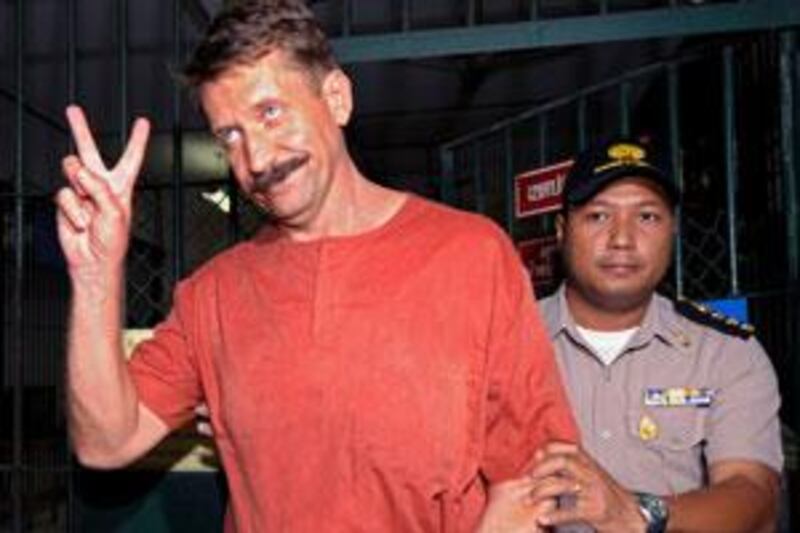A court in Thailand yesterday rejected an application from the US government for the extradition of Victor Bout, the former Sharjah-based air cargo operator wanted on charges that include conspiracy to supply arms to a terrorist organisation. Mr Bout, a Russian who was arrested in Bangkok a year ago in a sting operation by US agents, remains in prison; the US was given 72 hours to appeal against the decision. If it does not, Mr Bout, 42, who has repeatedly denied he is an arms dealer, will be free to return to Russia. Mr Bout was the subject of the book Merchant of Death. He is also said to have been the inspiration behind the 2005 film Lord of War. He was arrested in Thailand in March 2008 after agents of the US Drug Enforcement Agency (DEA) posed as members of the terrorist group the Revolutionary Armed Forces of Colombia (Farc). According to the agency's testimony, representatives of Mr Bout agreed to supply the "terrorists" with a range of weapons, including surface-to-air missiles, which would be parachuted into Colombia. Judge Jitakorn Patanasiri ruled that the US charges were "not applicable under Thai law. This is a political case". The Farc is fighting for a political cause and is not a criminal gang. Thailand does not recognise the Farc as a terrorist group." After the hearing, an official at the Russian embassy in Bangkok said Moscow was "satisfied" with the court's decision, but added: "This case will be over when Mr Bout is home." That will not be any time soon if the US embassy gets its way. James Entwistle, the deputy chief of mission, said Thai prosecutors would appeal against the ruling with the support of Washington. "We're disappointed and mystified by this lower-court ruling," he told the Associated Press. "We think the facts, relevant Thai law, and the terms of the bilateral extradition treaty clearly supports the extradition of Victor Bout to the United States to stand trial on serious terrorism charges." On Monday, Mr Bout's wife, Alla, who is in Bangkok, told the Russian news agency ITAR-Tass that she hoped her husband would be released.
"If the court is impartial and turns an attentive ear to the defence, there will be no extradition. If the US request is sustained, we shall file an appeal," she said. The evidence considered by the Thai judge had included a sworn statement from Richard Chichakli, a Syrian-born US citizen who in 1995 helped found and became the commercial manager of Sharjah Airport International Free Zone. He returned to the US in 1996. "I am delighted to hear the news concerning Victor's case, and glad that I was able to help," Mr Chichakli said. Mr Chichakli, a first-generation immigrant, served with the US military for three years prior to coming to the UAE. He says he first met Mr Bout in August 1995, when the Russian was one of hundreds of investors setting up businesses in the new Sharjah free zone. Both men were aviation enthusiasts and became friends. Mr Chichakli said the US government froze his assets during its investigation into Mr Bout; although that investigation was concluded last year, his assets are still being withheld. "I hope someday soon, I will be vindicated like Victor," he said. "It is just a matter of time." In 2001, the United Nations accused Mr Bout of violating sanctions against Liberia. It said he had played "a key role in supplying arms to Charles Taylor's regime in Liberia and the Sierra Leone rebel group, the Revolutionary United Front". jgornall@thenational.ae
For a report into Mr Bout's time in the UAE and an interview with his acquaintance, Andrei Semenchenko, who is on death row in Sharjah, click here






